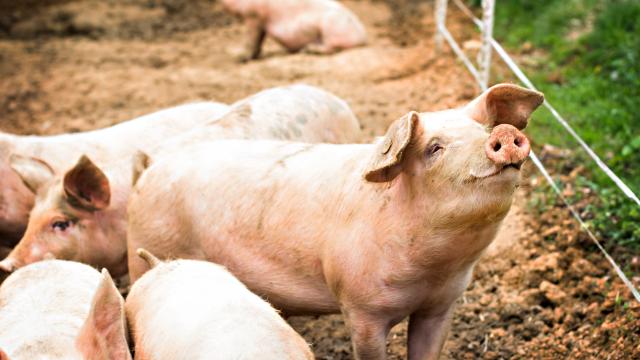Recently, headlines warned of a new flu virus with “pandemic potential,” based on a study of viruses on pig farms in China. There’s no need to immediately start freaking out, however: While it’s always a safe assumption there will be another pandemic someday, this one is not cause for concern just yet.
What did the study find?
The paper is a report from a program that periodically tests pigs on farms to see if they have any interesting new viruses. Pigs, birds and humans can all share flu viruses, although in most cases a virus that specialises in one species won’t infect another.
The weird thing about influenza, though, is that its genes are like a deck of cards that can shuffle in with another virus’s. If an individual is infected with two different flu viruses, a hybrid virus might result. Most viruses don’t do this, but the flu does. And when this happens, it often happens in pigs. If you want to nerd out about the details, there’s a good explainer on SciTable.
According to the study, a virus they’re describing as “G4, EA, H1N1” has been circulating in pigs since at least 2016. It is able to infect humans, not just pigs. A very few people have been known to contract it, and nearly 10% of farm workers on certain farms have antibodies to it, meaning they may have had been infected without realising.
What does it mean for a virus to have “pandemic potential”?
First, it’s important to note that this virus has been around for a few years and it has not caused a COVID-19 style pandemic.
However, as virologist Angela Rasmussen explains in a Twitter thread, G4 has a couple of features that give it “pandemic potential.” It can easily enter human cells (some animal flu viruses cannot). It can reproduce in human cells and create infectious particles. It may be transmissible from human to human, but we aren’t entirely sure yet. But, crucially, we don’t have any proof that the virus can make people seriously ill. If you catch a virus but your health doesn’t suffer, it’s not much of a problem, is it?
So far, we’re safe. But flu viruses like to mutate, so this one could be a problem, if it mutates to take those extra few steps. Or as Rasmussen puts it: “Yes, this virus could evolve the ability to be an efficiently transmitted human-to-human pathogen.”
So how scared should we be?
Here’s the thing about the flu: There’s always another pandemic around the corner, we just don’t know when it will come. I remember this coming up in every biology class when I was in school in the early 2000s. The professor would tell us about past influenza pandemics, including the one in 1918, and point out: we’re due.
There was a pandemic flu strain in 2009, you may recall. It was bad! Not COVID-19 bad, but a lot of people got sick and a lot of people died. Fortunately the CDC and its counterparts across the globe got their act together pretty quickly, and things worked out ok. One nice thing about the flu’s variability is that we already have a flu vaccine pipeline that changes every year. So once scientists knew that 2009 H1N1 was going to be a problem, they got to work and we had a vaccine for it very quickly.
Could this new virus be as bad as the 1918 flu? A manageable problem like the 2009 one? Or something worse? We don’t know. But the first step in pandemic management is keeping an eye on what viruses are out there. It’s not time for you and I to panic, but it is a good thing that virologists and epidemiologists know that this virus is one to keep an eye on.

Leave a Reply
You must be logged in to post a comment.